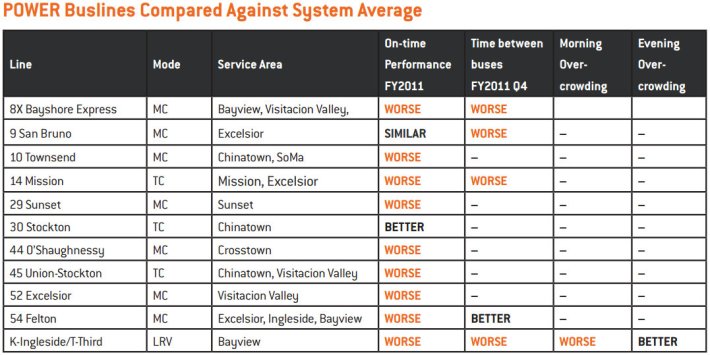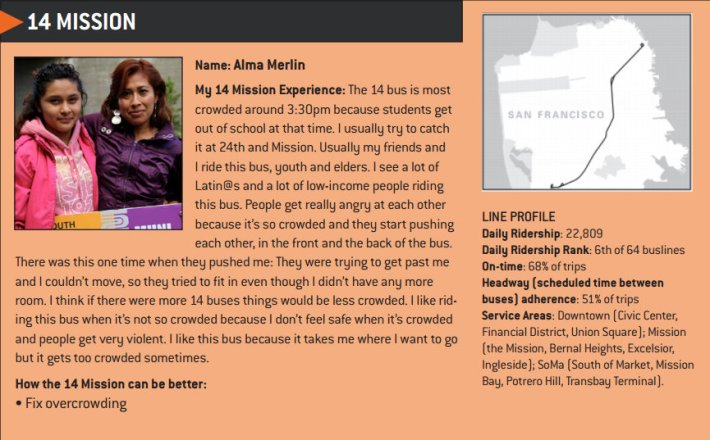Advocates for San Francisco's low-income communities have issued a new report calling for policy changes intended to improve Muni service, increase mobility for transit-dependent San Franciscans, reduce pollution from driving, and improve the city's economy.
"Next Stop: Justice" was released last month by People Organized to Win Employment Rights (POWER), a group that made headlines over the past year with its Free Muni for Youth campaign. The report highlights the disproportionate impact of poor transit service on San Franciscans who have few transportation options, calling for shifting policy and funding priorities from the automobile to public transit, more bus-only lanes, keeping Muni fares low, and scaling back fare enforcement.
Jaron Browne, POWER's communications director, said the report is intended to increase the visibility of Muni's role in improving equity, the environment, and economic opportunity in San Francisco.
"Public transit is already so pivotal, and will be increasingly pivotal for the way that the city functions as a whole, for the future of the planet, and for the way that our families in our communities can access all the resources and opportunities that our city has at hand," he said.
The report includes "key strategies that we think would help facilitate having a robust transit system that's well-financed and serves the needs of all San Franciscans, including working class bus riders and the transit-dependent," added Browne.
Based on data on Muni's reliability in low-income neighborhoods, POWER's report states that "the on-time performance on each of these lines in Southeast San Francisco is significantly worse than the system average" of less than 60 percent.
While POWER doesn't necessarily assert that Muni distributes transit service and improvements inequitably throughout the city, the group says system-wide problems like unreliable, infrequent service and overcrowding have a greater effect on low-income residents. "In transit-dependent, low-income communities, where folks don't have other means to get around, the impact is more severe," said Browne. "There are long commutes of more than an hour to get out of Bayview, even if it's a distance that would only take 10 minutes to drive," leading some families to pool their money and buy a car.
Jeff Hobson, deputy director of TransForm, said the group "welcomes POWER's presence and organizing in the struggle to win better, more affordable, reliable, and efficient transit for everyone."
"Today, it takes too long to get anywhere when buses get stuck in clogged traffic," he said. "Public transportation riders should not be punished with long, frustrating trips - instead, transit should be as smooth and efficient as any other means of travel. Dedicated lanes, all-door boarding, signal priority systems and even level boarding are transit improvements TransForm has long been pushing for."
One of the recommendations in POWER's report is "shifting transportation policy to prioritize public transit over car travel," and Browne said the group's members are "excited" about "creating whole areas of the city that really prioritize transit." He specifically mentioned bus-only lanes on corridors like Mission Street and in Chinatown as opportunities. Those are the kind of improvements expected to be implemented in the coming years as part of the SFMTA's Muni Transit Effectiveness Project.
"We've been looking at San Francisco -- as a green city, as a progressive city -- and how much more we need to do to restrict the auto," said Browne, "and to really achieve the goal that so many San Franciscans, and so many people even in the city family have identified, to really become a transit-first city." Browne did note, however, that the group doesn't necessarily support stop consolidation on local service or congestion pricing.
To help fund transit improvements and increased service, the report recommends "taxing large developers and corporations," a measure Hobson said TransForm agrees with.
"The city should seriously investigate the following options: increasing the impact fee on new development to a more appropriate level, taxing technology companies, creating a transit assessment district, and taxing sports franchises for transit services," POWER's report says.
POWER produced this video last year to show the impact of poor Muni service on transit-dependent San Franciscans.
When asked about the recent push to extend the Transit Impact Development Fee to include large non-profit developments, Browne said POWER didn't get behind the measure because the misconception that it would tax small non-profit companies "ended up poisoning the water for something that's actually a really progressive measure."
"It was unnecessary and not useful to include non-profits in that, and the process was too rushed," said Browne. "The community wasn't engaged, and the dialogue wasn't there, so we did not endorse that proposal because of the alienation of the non-profit community."
To encourage ridership, the POWER report also pushes the SFMTA to keep transit fares low, citing a 1991 study from the American Public Transportation Association which found that "every 10 percent increase in fares decreases ridership by 4 percent."
"Nearly half of the 727 bus riders surveyed in San Francisco’s low-income communities and communities of color said they could not afford Muni’s rising fares," the report states.
Fare enforcement also continues to be a point of contention for POWER, which criticized the SFMTA's 2010 efforts to ramp up enforcement, saying it was disproportionately targeted at low-income communities and immigrants. Although the SFMTA did report a drop in fare evasion in 2010, Browne asserted that the SFMTA's level of enforcement continues to be over the top, and that the agency, which spends $9.5 million on officers per year while taking in $1 million in citations, loses money on it.
"I think at the very least, San Francisco should scale it back to keep the program to where they're breaking even," said Browne. "Even if you reduced the program by $8 million in expenses, and you had some fare enforcement officers, but nothing like the scale we have now, you would see less harassment, less of an aggressive impact."
"The reality is it's created a level of tension because of the relationship that people have with the criminal justice system," he added, claiming that "the MTA can't demonstrate that they've had an increase in farebox collection" since it ramped up enforcement in 2006.
SFMTA spokesperson Paul Rose disagreed. "Fare enforcement can and does have an impact on compliance," said Rose. "For about a year, we have been redeploying our proof of payment officers more efficiently across the city, rather than by specific lines. During this time, inspections have increased and compliance has improved."
"Most recent numbers indicate that in November 2012, our proof of payment officers completed 223,000 inspections and issued more than 5,000 citations," said Rose. "This represents nearly 17 percent more inspections compared to November 2011. During the same time frame, the fare inspection ratio that compares actual inspections to citations-issued improved from 3.5 percent to 3 percent. Overall, due in part to more efficient enforcement, this rate was reduced to 3.6 percent from 5.3 percent when you look at the entire fiscal year. Transit fare revenue, as of November, was up by $1.6 million."
The full report can be found on POWER's website.
Streetsblog will be offline Monday in observance of Martin Luther King Jr. Day, and will be back publishing on Tuesday.







